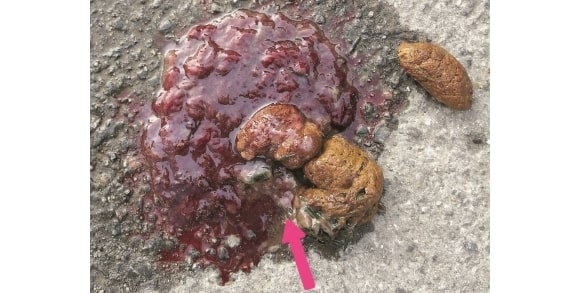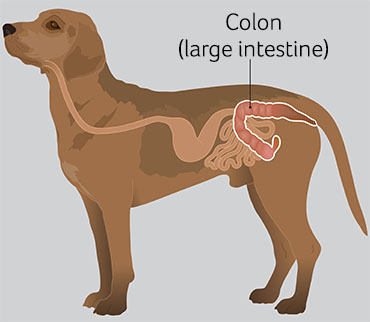Colitis in dogs
Overview
- Colitis is when the large intestine (colon) becomes inflamed.
- Colitis causes diarrhoea that often contains blood and mucus.
- Treatment for colitis depends how severely and how often your dog suffers from it.
- Most dogs recover from colitis within a few days and have no further issues, but some need ongoing treatment for a form of colitis that comes and goes throughout life.
- Contact your vet for an appointment if you suspect your dog has colitis - it can be helpful to take along a stool sample (or a photograph of your dog's stool).
Symptoms of colitis in dogs
- Diarrhoea containing blood or mucus (or both)
- Straining to poo
- Vomiting
- A painful abdomen (tummy) - your dog may stand with a hunched back or sit in a “prayer position”.

Blood and mucus in a dog's stool
Causes
Colitis can be caused by:
- Stress
- Eating something unusual that causes gut irritation
- A gut infection, worms or other parasites.
Some dogs have a form of colitis that comes and goes throughout life (chronic colitis). The causes of chronic colitis include:
- Food allergies
- Immune-mediated disease (your dog’s defenses attacking its own colon)
- An ongoing gut infection, usually bacteria or parasites.

The colon is the last part of the guts before the anus (bottom). Click image to enlarge.
Treatment
Treatment for colitis may include:
- A bland diet (or special veterinary diet) for a short period.
- De-worming treatment if your vet suspects worms could be the cause.
- Probiotics (useful in some cases, but not all).
- Anti-inflammatories specifically for the gut, which reduce inflammation and pain. Anti-inflammatories for the guts are very different to NSAIDs – which aren’t safe for colitis.
Contact you vet if your dog has been treated for colitis and hasn’t improved within a few days. They may need further investigations, which could include a food trial, blood tests, x-rays, a scan or biopsies (taking samples) of the colon.
If your dog suffers from colitis regularly (chronic colitis), you will need to work closely with your vet to prevent flare-ups. Prevention measures include:
- Feeding a special food recommended by your vet
- No treats (even dental chews!)
- Prevent food scavenging
- Regular worming treatments
- Additional treatment from your vet during a flare-up.
Does my dog need antibiotics?
Antibiotics are rarely needed to treat colitis because bacteria aren’t usually involved.
Cost
Treatment for colitis can become expensive, especially if it becomes a long-term problem. Consider insuring your dog as soon as you get them, before any signs of illness start. This will ensure you have all the support you need to care for them.
It’s also very important to speak openly to your vet about your finances, the cost of treatment, as well as what you think is right for your dog. There are often several treatment options so if one doesn’t work for you and your pet then your vet may be able to offer another.
Published: July 2019
Did you find this page useful?
Tell us more
Please note, our vets and nurses are unable to respond to questions via this form. If you are concerned about your pet’s health, please contact your vet directly.
Thank you for your feedback
Want to hear more about PDSA and get pet care tips from our vet experts?
Sign up to our e-newsletter
Written by vets and vet nurses. This advice is for UK pets only. Illustrations by Samantha Elmhurst.

 Video found at youtu.be/qXH2fcE3kIE
Video found at youtu.be/qXH2fcE3kIE
